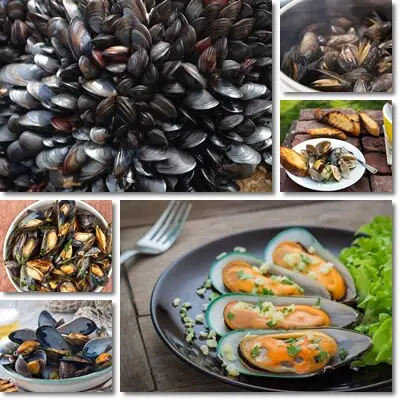Mussels are mollusks in the Mytilidae family and an important source of food worldwide. They can live in both freshwater and saltwater and feed by filtering water and retaining the nutrients from it. As a food, mussels are a rich source of B vitamins, particularly vitamin B12 and provide important amounts of protein and dietary minerals. They are a great food for muscle building, brain and nervous system health, combat brain fog and fatigue, boost energy levels, improve mood, regulate sleep and contribute to better bone density.
What do mussels look like?
Mussels look like black clams, but more elongated and narrower, like the shape of a potato wedge. They have a smooth shell with a concentric line pattern and, like all bivalve mollusks, they are joined by a ligament at one edge. Mussel shells have smooth edges, unlike oysters which can have sharp edges. Although most mussels appear black, a closer look at their shell reveals they can be black, dark blue, dark purple or dark green infused with brown and green.
For example, The Atlantic blue mussel (Mytilus edulis) appears black but is actually dark blue or purplish-black with occasional brown traces of color. The shell of the Asian green mussel (Perna viridis) is bright green with brown in younger specimens, while older ones are dark green with brown.

What do mussels taste like?
Raw mussels vs. cooked and farmed vs. wild-caught mussels taste. Unlike other mollusks like clams, oysters or scallops, mussels are generally eaten cooked, not raw. Also, wild-caught mussels tend to have more flavor than mussels from aquaculture. Lastly, fresh mussels have a much more pleasant flavor and are more likely to be more palatable than mussels that are not freshly-caught, not to mention the later are more likely to spoil and cause foodborne illnesses such as gastroenteritis with abdominal pain, diarrhea, nausea and vomiting.
This being said, if fresh and cooked right, mussels should taste good. Cooked mussels are more tender than clams and less mushy than raw oysters. They are soft, tender and light-tasting, with no overpowering briny or fishy flavors. Most mussels have a delicate sweetness to them and pleasant ocean flavors. At most, they are as fishy-tasting as crab meat.
The texture is slightly chewy, but nevertheless tender, similar to mushrooms.
What to look out for in mussels. A rubbery texture means the mussels have been overcooked. A bitter taste often means the mussels were not fresh or may be spoilt. Mussels that have not opened during cooking should be checked before eating. Mussels that are do not react and close when tapped or that are too heavy compared to others are presumed dead and not good for eating and should be discarded. Lastly, raw mussels can be carriers of several bacteria and toxins which is why it is important to always cook them well. High-risk individuals like young children, people with poor immunity or diseases that cause immunodeficiency should avoid seafood like mussels.

What do mussels go with?
First of all, mussels should always be cooked. They can be boiled, steamed, smoked, roasted or fried. Mussels go great with butter, lemon juice, white wine, cider, garlic and tomato sauces, various spices and herbs like chili peppers, ground pepper or parsley. Some people like plain steamed mussels recipes. They can also be made into broth, paired with rice, pasta or other seafood like shrimp, crab or clams.
What are the health benefits of mussels?
Eating cooked mussels can provide the following benefits and nutrients:
1) Rich in protein. Eating mussels provides excellent amounts of protein to your diet: 12-23 g of protein/ 100 g. Protein plays vital roles within the human body, helping build and repair muscle, boost immunity by helping produce antibodies and synthesize neurotransmitters in the brain that regulate mood, appetite and sleep. Eating enough protein helps clear thinking and combat brain fog.
2) Incredible vitamin B12 content. According to the United States Department of Agriculture Database:
– 100 g of raw, blue mussels provide 12 micrograms of vitamin B12
– 100 g of cooked (moist heat), blue mussels provide 24 micrograms of vitamin B12
The current recommended daily intake is 2.4 micrograms of vitamin B12.
In other words, eating only 100 g of cooked blue mussels can supply your diet with 10 times your vitamin B12 RDA. Vitamin B12 helps prevent anemia and preserves the myelin sheath protecting the tail of nerve cells, preventing nerve damage that could result over time in the onset of dementia, Alzheimer’s disease, multiple sclerosis and other degenerative conditions of the nervous system. Vitamin B12 is involved in energy metabolism and an adequate intake helps boost energy levels, combat physical and mental fatigue.
3) Excellent source of B vitamins overall. Mussels are rich in other B vitamins as well: thiamin, riboflavin, niacin, vitamin B6 and folate. In addition to elevated energy levels, B vitamins benefit digestion, nutrient absorption and brain health. Folate and vitamin B12 both help prevent neural tube defects of the brain, spine and spinal cord in newborns.
4) Good source of phosphorus, potassium and sodium. Mussels provide the following nutrients (estimated):
– phosphorus: 200-280 mg/100 g
– potassium: 270-320 mg/ 100 g
– sodium: 280-370 mg/100 g
These are good amounts (around 10% of the current RDI) of essential nutrients that promote good bone density, strong bones and teeth and regulate blood pressure. Sodium too is needed for maintaining an optimal blood pressure level, regulating blood volume and other benefits. Other minerals in mussels include small amounts of calcium, iron, magnesium and zinc.
5) Relatively low fat content and good caloric value. 100 g of mussels provides and around 2.2 to 4.5 g of fat and 85 to 170 kcal/100 g. These numbers recommend them for maintaining a steady weight, losing excess weight and cardiovascular health.
Health risks associated with eating mussels
Here are the most common side effects of the species and the reasons they are not always good for you:
1) Mussels allergy. Like all shellfish, mussels too are a source of allergic reactions. If you have known seafood allergies, avoid eating mussels. If you experience headaches, stomach upset, rashes on the skin, itching, tingling tongue and tongue swelling, difficulty breathing, drop in blood pressure, dizziness or fainting sensations, seek medical help immediately because you are likely having an allergic reaction that can culminate with anaphylactic shock.
2) Mussels food poisoning. It is caused by eating contaminated, raw, undercooked or spoilt mussels and has to do primarily with what mussels eat in freshwater and in the ocean. Both freshwater and saltwater mussels feed on phytoplankton and microscopic organisms by filtering water. But as they take in the water in search of the nutrients dispersed in it, they also filter pathogens like bacteria, viruses, parasites or toxins, including methylmercury that is naturally found in marine environments.
It is speculated that it is best to avoid eating mussels during warmer months when there may be an overgrowth of a certain type of algae which can produce neurotoxins (the phenomenon known as red tide). These toxins can accumulate in mussels, clams, oysters and other marine life that feed by filtering water and are subsequently harmful for humans if ingested via contaminated shellfish.
Why warm months? The folk tales say it’s best and safest to eat mussels, oysters and other shellfish in months that contain the letter ‘r’ (September, October, November, December, January, February and March). From May till late August it’s not good to eat mussels because the weather is warmer and so is the water, favoring the growth of pathogenic organisms which can accumulate in shellfish. Typically, all shellfish from fish farms are checked before reaching the market and as long as you get fresh mussels from fish markets that can provide quality certifications and are traceable to their fish farms of origin and cook them well, it should be safe to eat mussels when you want.
